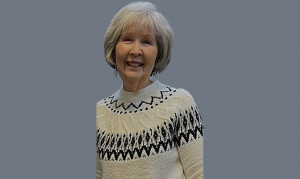When I was nine years old, I spent spring break with my grandparents in their humble mountains’ abode.
During that week, I got a real shiner in a yard game of baseball by being a catcher who stood too close to the batter; developed a love for buttermilk biscuits with homemade jelly and, on Saturday night, took my only bath of the week. In a tin tub. In the middle of the rickety, drafty kitchen. As I scrubbed away a week’s worth of dirt with homemade soap, my grandmother kept the water warm by bringing kettles of hot water and pouring it in.
I also furthered my life’s education by learning how to find the bathroom in the middle of the night, in the middle of the spooky woods.
My grandmother, Lizzie, was a gentle, kind woman. She was tall and so skinny that when she crossed her legs, one foot always tucked effortlessly behind her ankle. Her silvery, soft hair fell to her waist but was kept neatly up in a bun then released freely at night. On the scruffy beige couch, she would sit, when the day was finished, and patiently brush her hair before she changed into a long-sleeved, floor-skirting nightgown.
From the moment she dressed in the morning — in a simple, cotton dress, hosiery that stopped at her upper thigh and flat, black shoes — she wore an apron with a pocket in which she carried a small can of snuff. Her one true indulgence. In this apron, she toted eggs from the barn and, if I had a dirty spot or scratch, she licked the corner of it then wiped away my soil.
She loved the newspaper and the King James Bible, both of which she read with dedicated regularity. When worries knocked at her door, she did not hesitate to drop to her knees in front of the old iron bed, praying as a breeze lilted gently through the open window and fluttered the voile weight curtains.
Mawmaw — a word belonging strictly to the Appalachian mountains — loved to knit and crochet, usually employing cast-away rough thread from the nearby carpet mill. It was a treat for her. Somewhere around middle afternoon when the sweeping, dusting, and raking of the front yard were finished, she settled into a corner of that worn-out, formaldehyde couch, tucked her foot behind her ankle, pushed her tiny, wire framed glasses up on her nose, and set about fiercely crocheting a blanket or knitting a sweater.
That summer of my third-grade spring break, she placed a bony arm around my shoulders, drew me close to her on the couch and, patiently, began to teach me how to crochet. As she watched, I awkwardly weaved a chain with the tiny hook and unpleasant thread. By the time I returned home, I was adept enough that I began furiously crocheting headbands (a trend in the 1970s) and making a stockpile.
Mama, astounded that I had mastered crocheting and knitting when she, a skilled seamstress, could never learn, could always figure a way to make money. Cleverly, she began taking my homemade headbands to the sewing plant where she worked and selling them for two dollars apiece during her fifteen-minute breaks and thirty-minute brown bag lunches.
Whether it was Mama’s stellar salesman pitch, my expert crocheting skills, or a bit of both, those headbands sold like hotcakes to her fellow plant workers. Every day, she would come home from work, announce how much I had made, then begin pulling crumpled dollar bills from her purse. I was gloriously happy.
At an early age, I learned that I could make a living by the turn of my hands. This I learned from my simple Appalachian folks.
That lesson stuck. It has carried me down through the journey of life. I still earn a living by thinking and working creatively.
[Ronda Rich is a best-selling Southern author. Visit www.rondarich.com to sign up for her free weekly newsletter.]













Leave a Comment
You must be logged in to post a comment.